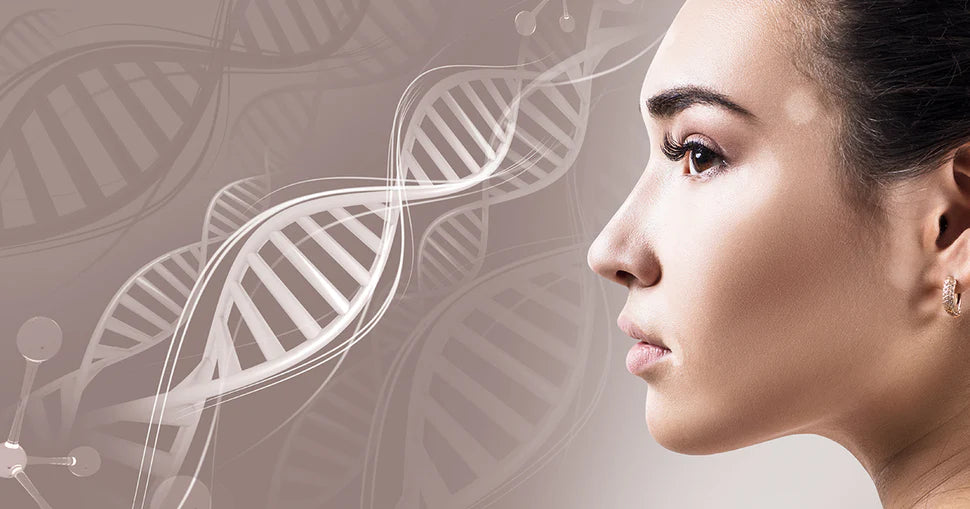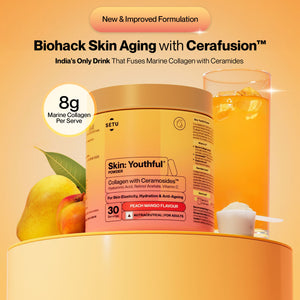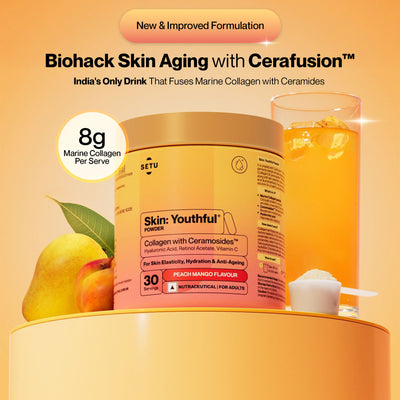The Power of Collagen: Understanding Its Role in Your Body
20 Jul 2024
Uncover the secrets of collagen and its vital role in keeping your body strong, healthy, and youthful. Collagen is a protein that plays a vital role in the health and functioning of your body. It acts as a building block for your skin, hair, nails, joints, and more. Understanding the importance of collagen and how it can benefit your overall well-being is crucial. Let's delve into the world of collagen and explore what you need to know.
Understanding Collagen
Collagen is the most abundant protein in the human body, making up a significant portion of your skin, bones, muscles, ligaments, and tendons. It provides structure and strength to these tissues, helping them maintain their integrity and elasticity.
There are different types of collagen, each with specific functions in the body. Type I collagen, for example, is essential for skin health, while Type II collagen is crucial for joint health.
As you age, your body's natural collagen production declines, leading to issues like wrinkles, joint pain, and brittle nails. Incorporating collagen-rich foods into your diet or taking collagen supplements can help support your body's collagen levels.
Sources of Collagen
Natural food sources of collagen include bone broth, chicken skin, fish, and beef. These foods contain amino acids that are necessary for collagen synthesis in the body.
For those looking for a convenient way to boost collagen intake, collagen supplements are available in various forms such as powders, capsules, and drinks. These supplements can provide an easy and effective way to support your body's collagen needs.
Collagen Supplements
Collagen supplements function by supplying essential amino acids that serve as the building blocks for collagen production in your body. These supplements come in various forms, such as hydrolyzed collagen, collagen peptides, and marine collagen.
Research indicates that incorporating collagen supplements into your diet can yield several benefits. Primarily, they are known to enhance skin elasticity, promoting a more youthful appearance and potentially reducing wrinkles. Additionally, collagen supplements have been shown to support joint health by maintaining cartilage integrity, which may alleviate joint pain and stiffness.
While collagen rich foods provide a natural and delicious way to enhance collagen production, it’s not enough to bridge the nutritional gap. Here’s where collagen supplements come to the rescue. Marine collagen, derived from fish scales and skin, shares similarities with human collagen and is easily absorbed by the body.
Including marine collagen supplements like Setu’s Skin: Youthful into your routine can offer comprehensive support for skin, joints, and overall well-being. Combining the benefits of collagen-rich fruits with marine collagen supplements can create a synergistic effect, providing a holistic approach to nourishing your body from the inside out.
Moreover, collagen supplementation can contribute to stronger nails, potentially reducing brittleness and promoting growth. Beyond skincare and joint benefits, collagen supplements may also aid in gut health. By supporting the integrity of the digestive tract lining, collagen can help maintain gut barrier function, potentially reducing inflammation and supporting overall digestive wellness.
In summary, integrating collagen supplements into your daily regimen can support various aspects of health, from enhancing skin elasticity and joint function to promoting stronger nails and supporting gut health.
Prebiotic & Probiotic Benefits
Prebiotics and probiotic benefits are crucial components in maintaining gut health, which has profound implications for overall well-being. Prebiotics refer to non-digestible fibers found in certain foods that serve as nourishment for the beneficial bacteria residing in your gut. These fibers help stimulate the growth and activity of these bacteria, promoting a balanced gut microbiome.
On the other hand, probiotics are live bacteria that provide specific health benefits when consumed in adequate amounts. They help maintain a healthy balance of gut flora, supporting digestion and immune function.
The relationship between gut health and collagen production is significant. A healthy gut environment, fostered by a diet rich in prebiotics and probiotic benefits, plays a vital role in optimal collagen synthesis. By promoting efficient nutrient absorption and reducing inflammation in the gut, these components contribute to overall skin health and joint function.
Consuming foods rich in prebiotics and probiotics, such as yogurt, kefir, sauerkraut, kimchi, bananas, garlic, onions, and asparagus, can enhance the body's ability to produce collagen. This synergy between gut health and collagen synthesis underscores the importance of a balanced diet that supports both digestive wellness and skin integrity.
In summary, integrating prebiotic and probiotic-rich foods into your diet not only supports gut health but also enhances collagen production, contributing to overall health and well-being. Together, prebiotics and probiotic benefits work synergistically to maintain a healthy gut microbiome. This balanced microbiota not only supports digestion and nutrient absorption but also plays a critical role in immune function and inflammation regulation.
The Science Behind Collagen Synthesis
Collagen synthesis, the process by which the body produces collagen, relies on several key nutrients and is influenced by various lifestyle factors. Among these nutrients, vitamin C and zinc play crucial roles. Vitamin C is essential for collagen formation as it serves as a cofactor in the enzymatic reactions that stabilize collagen molecules. Zinc, on the other hand, supports the synthesis of collagen fibers and helps maintain their structure.
Ensuring adequate intake of these nutrients through a balanced diet or supplementation can significantly support collagen synthesis. Foods rich in vitamin C include citrus fruits, strawberries, bell peppers, and broccoli, while zinc can be found in foods such as oysters, beef, poultry, and beans.
However, collagen synthesis can be negatively impacted by certain lifestyle factors. Chronic stress can lead to increased levels of cortisol, a hormone that can break down collagen and impair its production. Inflammation, whether from dietary choices high in processed foods or conditions such as arthritis, can also interfere with collagen synthesis. Additionally, poor dietary choices lacking essential nutrients can deprive the body of the building blocks necessary for collagen production.
To safeguard your body's collagen reserves, it's essential to make mindful lifestyle choices. This includes managing stress through techniques like meditation or exercise, adopting an anti-inflammatory diet rich in fruits, vegetables, and omega-3 fatty acids, and avoiding excessive sun exposure and smoking, which can accelerate collagen breakdown.
By prioritizing a healthy lifestyle and ensuring adequate intake of essential nutrients, you can support optimal collagen synthesis and maintain healthy skin, joints, and overall structural integrity throughout the body.
Tips for Boosting Collagen Production
Boosting collagen production naturally involves adopting various lifestyle habits and dietary choices that support the body's ability to synthesize collagen. By incorporating these habits into your daily routine, you can support natural collagen production, maintain skin elasticity, and promote overall skin health.
-
Consuming Collagen-Rich Foods
Foods such as bone broth, chicken, fish, and egg whites contain nutrients that support collagen formation, including amino acids like proline and glycine. Incorporate foods rich in collagen-promoting nutrients such as vitamin C (citrus fruits, berries, bell peppers), zinc (oysters, beef, poultry), and amino acids like proline and glycine (bone broth, chicken, fish).
-
Use Collagen-Boosting Products
Consider using skincare products or supplements containing ingredients like collagen, vitamin C, hyaluronic acid, and zinc, which can stimulate collagen production effectively. Hydrolyzed collagen supplements (collagen peptides) are readily absorbed and can support collagen synthesis from within. Consult with a healthcare professional before starting any new supplement regimen
-
Avoid Excessive Sun Exposure
UV rays can accelerate collagen breakdown. Use sunscreen daily, wear protective clothing, and seek shade to minimize sun damage and preserve collagen integrity.
-
Quit Smoking
Smoking reduces collagen production and accelerates skin aging. Quitting smoking can help improve collagen synthesis and overall skin health.
-
Incorporating Regular Exercise
Exercise stimulates circulation, which helps deliver nutrients to skin cells, including those involved in collagen production. Resistance training, in particular, can promote collagen synthesis by stimulating muscle growth and repair.
-
Striving for a Balanced Lifestyle
A balanced diet rich in vitamins, minerals, and antioxidants supports overall health and can enhance collagen synthesis. Include plenty of fruits, vegetables, lean proteins, and healthy fats in your daily meals to provide the necessary nutrients for collagen production. Ensure your diet includes a variety of nutrient-dense foods rich in vitamins (A, C, E), minerals (zinc, copper), and antioxidants (like those found in colorful fruits and vegetables), which support collagen production and overall skin health.
- Take Probiotics & Prebiotics
Prebiotics and prebiotics play pivotal roles in maintaining a healthy gut microbiome, which in turn supports efficient nutrient absorption essential for collagen synthesis. Incorporate probiotic-rich foods (yogurt, kefir, sauerkraut) and prebiotic-rich foods (bananas, garlic, onions) into your diet. Probiotics are beneficial live bacteria that promote gut health. These probiotic benefits maintain a diverse and balanced gut microbiota, which is crucial for optimal digestion and nutrient absorption. By supporting gut health, probiotic benefits contribute to the absorption of key nutrients that are vital for collagen synthesis. Prebiotics, on the other hand, are non-digestible fibers that act as fuel for the beneficial bacteria in the gut, helping them thrive and multiply. A healthy gut environment enhanced by prebiotics and probiotic benefits promote intestinal barrier function and gut integrity for efficient nutrient absorption.
Conclusion
Collagen is a powerhouse protein that plays a crucial role in your body's overall health and well-being. Understanding how collagen works, where to find it, and how to support its production can help you take charge of your health.
By incorporating collagen-rich foods, considering collagen supplements, and prioritizing a healthy lifestyle, you can ensure that your body has the support it needs to thrive. Here's to harnessing the power of collagen for a healthier, happier you!
Skin: Youthful with Marine Collagen & Ceramosides™
- ₹1,594
- ₹1,594
-
₹2,200 - ( 27% OFF)
Categories
- Choosing a selection results in a full page refresh.
- Press the space key then arrow keys to make a selection.
this is the sidecart
















